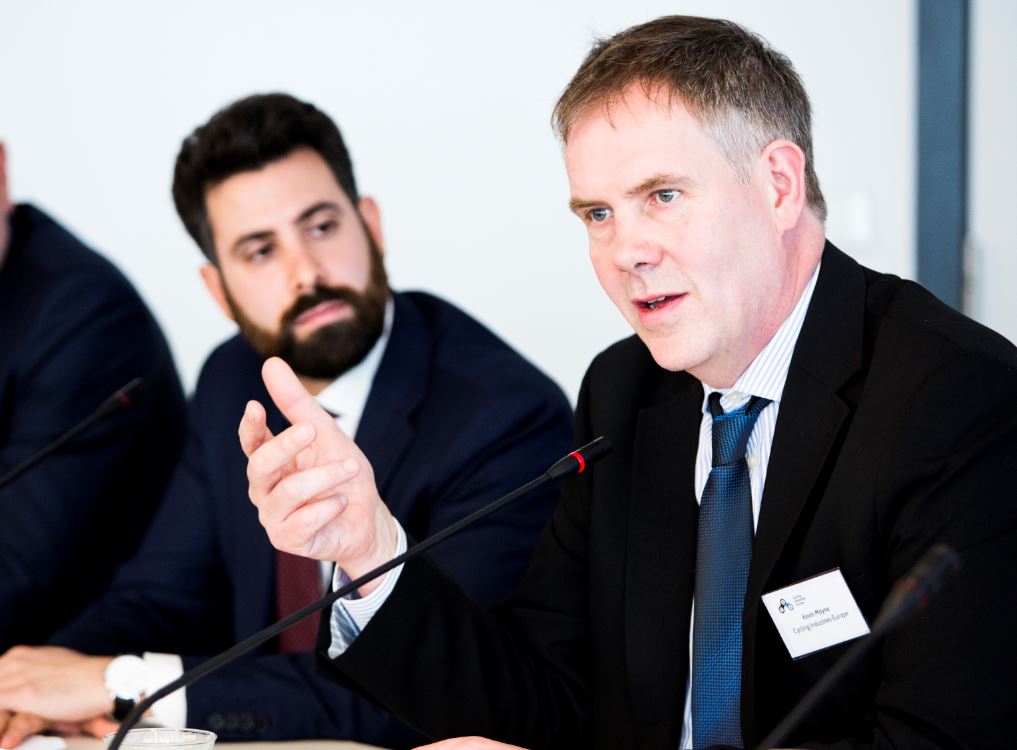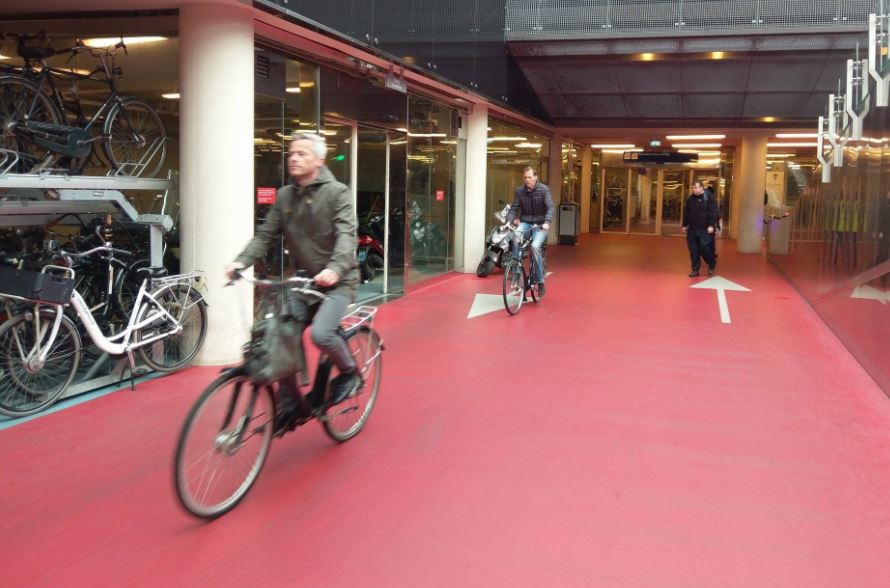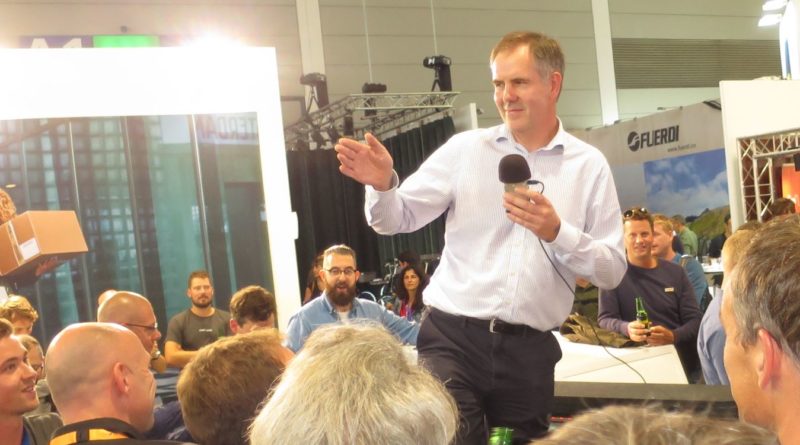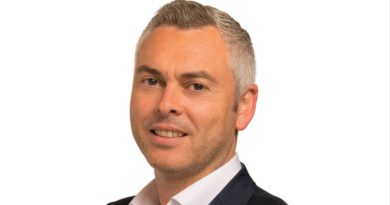CIE CEO Kevin Mayne talks getting cycling on the political agenda and investor interest
While the UK’s trading relationship with the rest of Europe is going to take some time to adjust, one European industry organisation has been working tirelessly to deliver a unified message on behalf of the bike business. Kevin Mayne CEO of Cycling Industries Europe charts some remarkable progress in securing top-level policy discussions and increasing investor interest.
 To be spent by the end of 2022 the EU’s €670 billion Recovery and Resilience facility hopes to “mitigate the economic and social impact of the coronavirus pandemic and make European economies and societies more sustainable, resilient and better prepared for the challenges and opportunities of the green and digital transitions.”
To be spent by the end of 2022 the EU’s €670 billion Recovery and Resilience facility hopes to “mitigate the economic and social impact of the coronavirus pandemic and make European economies and societies more sustainable, resilient and better prepared for the challenges and opportunities of the green and digital transitions.”
All of a sudden, with the Green Deal making headlines across Europe a new priority is on the agenda and that, quite simply, is bringing about change that could feasibly have a meaningful impact on turning down the heat our planet is experiencing and reversing tends that have been in the ascendancy since the Industrial Revolution began to kick up steam. The bottom line: the transport sector (excluding shipping) contributes 22% of greenhouse emissions of which road-based transport contributes nearly 72%. Broken down further 44% came from passenger cars, 9% from light commercial vehicles and 19% from heavy goods vehicles.
There’s room for improvement and, whether it’s throwing money at developing hydrogen technology or promoting efficient and clean transport, the European Commission are attempting to lead the world in green terms. Finally, it feels like something in the political world has changed and for the bike industry that’s good news.
For Kevin Mayne, CEO of EU trade umbrella Cycling Industries Europe, the alignment of the planet’s goals with a green transport agenda has opened doors previously harder to leverage; but more than that, a collective and unified voice spanning businesses across Europe has been infinitely more powerful still.
“Our working groups have really been the key here and that’s where the bike industry had differed from other industries previously. There existed good expertise in creating standards, but arguably little in the way of expert groups for technology and policy, so when questions were asked of the wider business by policy makers our answers were lacking certainty. That makes a big difference in how seriously you are taken. Nowadays we have an expert at the table for everything, from business and innovation, through to bike sharing, cargo bikes and logistics and plenty more,” says Mayne.
Each of these groups, made up of members of Cycling Industries Europe, brings to the table expertise from their respective sectors and most importantly data to back up any claims to be made should the bike world be presenting a case for investment or political leverage to enable cycling’s many forms to flourish.
“Data is crucial, it’s required to help both inside and outside of the bike industry. In the past everybody made a beeline for Germany for trade as it was by default the biggest market. With better data we can begin to understand much broader opportunities. Poland, for example, has written cycling into its recovery plan, so when I’m thinking about where to launch my product, why not there?” starts Mayne.
“We’re now understanding the power of data as a tool to represent us. For example, we have been able to present to the EU’s Executive Vice President and Green Deal Chief Frans Timmermans a completely professional and structured case for investing in cycling as part of the budget that has to be spent on making transport more sustainable, as well as European manufacturing. His team really grill us, but we always have an answer thanks to the way our groups collaborate behind a common goal.”
So, what can the bike industry do by 2022 that’s compelling to the EU’s deep pockets? We’re told that lots of infrastructure could be built, incentives rolled out to stimulate electric and cargo bike uptake, as well as schemes to level the playing field in countries where access to bikes and e-Bikes is financially more of a stretch. Luckily for cycling, it is one of the most accessible forms of transport, but the idea of putting e-Bikes in the hands of those in South Eastern Europe could appeal greatly as a means of stimulating a green recovery in less affluent economies. “We want cycling to be a force for success, that can’t just be a North Western Europe success story,” says Mayne.
To have the ear of the EU’s Exec Vice President is no mean feat and requires credibility. Agreeing to be a “champion of cycling” in the EU, Timmermans’ influence on policy could trickledown dramatically across Europe, with money and guidance on policy mirrored across member states and, if we’re lucky, in a post-Brexit Britain too.
As was seen with the bike repair voucher scheme – pinched from France who pioneered the idea and adapted by Scotland who arguably did it better – England’s current Government has tended to look elsewhere for policy ideas. So, to what extent does Brexit and Britain’s future policy making weigh in to how much our population stands to benefit from the progressed made by Mayne’s teams?
“If the UK bike industry is regarded as out of kilter with the rest of Europe this will make the relationship more challenging, for example on standards or trade rules,” says Mayne. “However, there has been a burst of interest from UK firms hoping to keep a foothold in Europe. What’s interesting is that the UK can still buy in to European research programmes, but we don’t know yet whether it will.”

Cycling Industries Europe has certainly not discriminated and actually has a significant UK membership, many of whom have joined in a bid to keep abreast on best practice when it comes to trading across borders, but also to learn from the organisation and export some of its policy influencing ideas back home. For some this has been taking advice on whether a European office or subsidiary is worth giving thought, while for others it has exploring the possibility of joint ventures. Then there’s the carrot of the EU’s research and innovation funding, which can prove transformative for those who access it.
CIE’s Innovation and SMEs working group will be of particular interest to businesses looking outwards for investor cash. Noting an accelerating trend for significant sums of money flowing into the bicycle business from outside in recent years, Mayne says that the expertise channelled here has sparked conversations of the like he’s never had before.
“I’ve had some remarkable conversations with investment bankers who would like to put money in to the cycling industry but are unable to choose where to start. Part of our thinking now is to create a space for the investor to see what’s going on in cycling and giving a mentorship role to those brands occupying it. This comes alongside EU funding, which is definitely looking for a home where the key criteria are met,” says Mayne, speaking on the day Italy’s BluBrake scored a €5.2 million funding packet from the private and institutional investor.
Such a model worked favourably for the Mountain Bike Centre of Scotland, which was toured by CIE in 2018. Mayne describes this as a “flagship project in European terms” and one that visitors have quickly sought to emulate at home.
Likewise, the bike sharing working group has taken the bull by the horns and has begun to develop partnerships to benefit the wider network. When cities come knocking the group has created a best practice structure for success where previously the waters have been choppy to navigate.
Pooling all this expertise has other benefits too. When the industry faces broad discussions on things like creation or adaptation of standards, the network can respond very quickly in the best interests of the cycling market. This is presently happening with electric bikes, where a commissioned review proposed by the European Commission seeks to understand whether the regulations governing the many styles of electric bike (and e-Scooter) are appropriate.
On the subject Mayne is cautious not to “kill the goose that laid the golden egg”.
“We can always do better, though it should be stated that our EU regulations for e-Bikes are the envy of the world. The Australians, for example, followed Europe’s lead. A 25km limit is understandable and quickly helped globalise development, though the USA is different. Our 28-country assembly is the gold standard and part of the reason why Giant, among others, are building factories here. This is the best market in world to sell e-Bikes, so why put that at risk?”
It will be the UK’s Transport Research Laboratory that surveys the industry and determines through its desk- based research which, if any e-Bike styles, would be best suited to a legislation tweak. There are advocates of the speed pedelec, but there are just as many opposed.
Arguably vehicles carrying a heavier load, such as commercial cargo bikes, may have a stronger case for greater assistance than a smaller e-Folding bike, for example. But Mayne makes the point that, with the cargo bike market growing consecutively each year and up 60% last year alone, progress has not exactly stalled for this burgeoning segment. What’s more, the Cargo Bike working group could not be better placed to make a call on what’s both practical and desirable.
“We have of course gone to the working group and asked of professional companies their insurance records and the findings of their own research. We asked whether they would release any accident records and they did. We will anonymise this data and pass it over. For TRL that’s immensely valuable. By the looks of the findings Cargo bikes are the safest bikes on the planet, so we look forward to submitting this evidence,” says Mayne.
Trek’s John Burke is namechecked by Mayne for inspiring the approach now taken by his orgs. “In bike industry terms he was a founding voice of this kind of school of thought, where all ships rise together if competitors share the lobbying cost and collaborate. Compared to sponsoring a Tour team, this kind of work is inexpensive and really changes things. Of course, politics and lobbying is not close to home for everybody, so the trust placed in Cycling Industries Europe is crucial and now paying dividends.”
While the scars of the pandemic have nonetheless shown for some, the bike industry has generally got off rather lightly with Covid-19 in business terms. While on the one hand this could be down to people’s fears of sharing transport, Mayne says it is just as justifiably attributed to industry organisations across Europe almost instinctively signing rom the same hymn sheet.
“The industry at large understood there was a political process and thereafter put together a professional plan to meet the challenge head on. Shops across Europe were largely kept open by lobbying efforts in order to service the need for transport and permitted exercise. The well- coordinated approach to addressing this professionally I don’t think has gone unnoticed. The message and delivery were spot on and I think our industry demonstrated how bicycles are a serious part of the transport make up. Like- wise, the sport side shut down when appropriate, building immense trust with Governments. Moving the Tour de France dates is really a monstrous thing to have to do,” says Mayne.
That praise extends down to the grassroots advocates and bike shops who took it upon themselves to talk to local politicians about cycling and to offer what became an essential service over long hours. “Politicians pick up on the language if it is unified and professional,” we’re told.
“Every now and then something comes along that can accelerate progress out of nowhere, the difference is this time we’re prepared. We’re not just grateful to be in the room on policy discussion anymore,” concludes Mayne. “We’re there for every discussion and well equipped to make a difference.”



